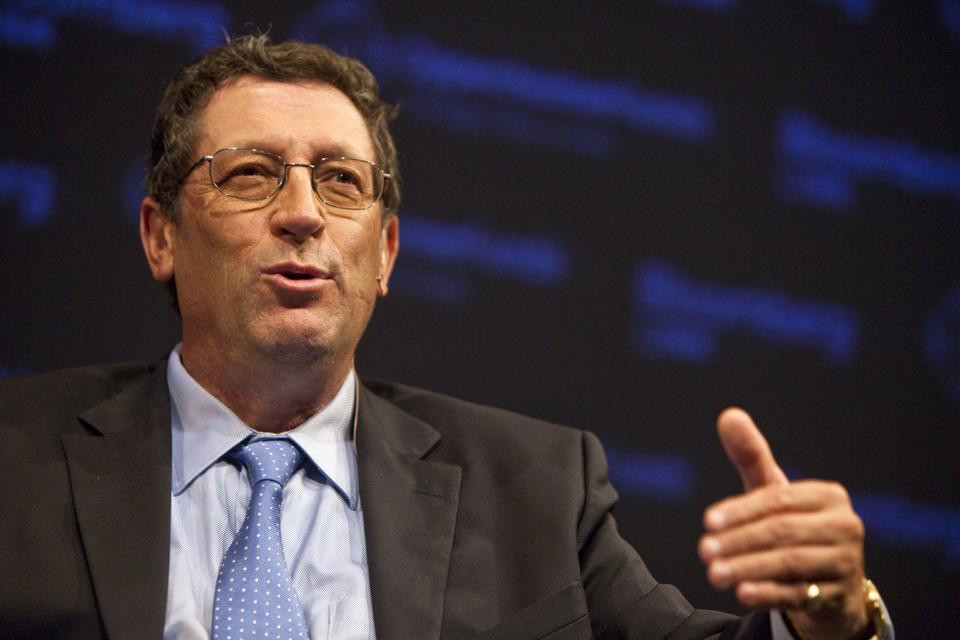
Date: 2024-12-30 Page is: DBtxt003.php txt00021127
US Economy
Study from Blanchflower and Bryson
The U.S. Economy May Be Facing Another Recession, New Research Suggests

David Blanchflower, professor of economics at Dartmouth College, speaks at the Bloomberg Global ... [+] © 2011 BLOOMBERG FINANCE LP
Original article: https://www.forbes.com/sites/pedrodacosta/2021/10/14/the-us-economy-may-be-facing-another-recession-new-research-suggests/
Opne PDF: Blanchflower-Bryson-NBER-US-fear-Oct-7-2021.pdf
Burgess COMMENTARY
The Blanchflower-Bryson paper is more interesting than the Forbes article about the paper. The authors of the paper present quite a lot of data and charts which show more than anything the ddifficulty there is in making reliable economic projections and in explaining past behavior. The big economic events show up quite well ... but not the more mundane day-to-day changes. I stidied this sort of data as an economics student at Cambridge more than 60 years ago, and while the data are a lot more voluminous today, they remain incredibly imprecise. Worse, some of the most misleadings metrics from a technical standpoint like GDP changes and stock market indices are part of media chatter in the mainstream news. I see economics at the macro level to be a result of the aggregation of a multitude of micro-economic behaviors where cause and effect are much more obvious. When I try to understand the disconnect between amazing technology and poor socio-economic performance and the rapidly growing climate crisis, I conclude that a lot of big decisions are made by politicians (especially modern GOP politicians) and government bureaucrats because they operate without any meaningful management metrics and accountability.
Peter Burgess
Pedro Nicolaci da Costa ... Pedro Nicolaci da CostaSenior Contributor Markets ... I have been writing about economics, markets and the Fed since 2001.
Oct 14, 2021,02:30pm EDT|3,874 views
The U.S. economy may be heading for another downturn within the next six months if sagging consumer expectations are any guide, according to new research from ex-Bank of England member David Blanchflower.
It’s a counterintuitive prediction given all the talk of recovery and inflation fears permeating the economic debate at the moment. U.S. gross domestic product soared an annualized 6.7% in the second quarter while consumer prices are running at 5.4% in the year to September.
But Blanchflower, now at Dartmouth College, and his co-author Alex Bryson, suggest the above figures are merely offering a look into the rear-view mirror.
“It seems to us that there is every likelihood that the United States entered recession at the end of 2021,” the authors write in a new research paper. “The most compelling evidence is from the Conference Board expectations data for the eight biggest states.”
They say a recent sharp decline in the jobless rate to below 5% has been driven by unusually supportive fiscal policy, masking other signs of weakness in the outlook.
Those figures show drops comparable to those seen in 2007, just before the start of the Great Recession, which was the worst in generations.
Blanchflower notes forecasters totally missed that downturn despite warning signs from housing and finance that something was awry.
“By the Spring of 2007 qualitative data pointed to a recession coming in a few months and this was ignored,” he says. “Today we report equivalent evidence for the U.S. showing comparable declines suggesting that the US is entering recession now, at the end of 2021.”
The call stands in sharp contrast to private sector forecasts and those of Federal Reserve officials, who see the U.S. economy expanding 5.9% this year and 3.8% next year.
Against that backdrop, officials are planning to scale back their $120 billion in monthly bond purchases starting in November, and financial markets have started to price in the first interest rate hike as early as mid- to late-2022.
“The Fed appears to be headed for premature tightening,” said Blanchflower. “The Fed missed the Great Recession and the concern is they have missed the next one.”
Blanchflower and Bryson’s results hold over a long historical period, giving them additional confidence in the prognosis.
“We show consumer expectations indices from both The Conference Board and the University of Michigan predict economic downturns up to 18 months in advance in the United States, both at national and at state-level,” they write.
“All the recessions since the 1980s have been predicted by at least 10 and sometimes many more point drops in these indices.”
Pedro Nicolaci da Costa ... Pedro Nicolaci da Costa is a Senior Reporter at Market News International, where he covers Federal Reserve policy and the economy. He has been writing about economics and financial markets since 2001, at Reuters, The Wall Street Journal and Business Insider. Pedro was a fellow at the Peterson Institute for International Economics from 2014 to 2016. In 2010, da Costa co-authored 'Cozy Ties at Club Fed,' a report that prompted the central bank to adopt a more transparent communications policy that includes holding quarterly press conferences. His reporting on the failure of some academic economists to disclose financial industry ties resulted in the American Economic Association's adoption of a new code of conduct. Both articles received journalism awards.
-----------------------------------------
MORE FOR YOU
- Stocks This Week: Buy KLA Tencor And Starbucks
- Fintech Stocks Continue To Lag The Market. Time To Buy?
- What’s Next For BlackBerry Stock After A 4% Move Last Week?

GDP growth by quarter from 1949 t0 2021